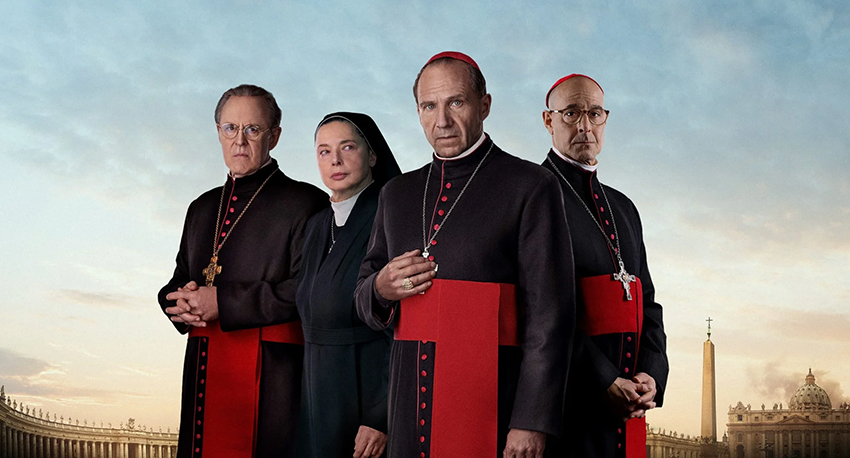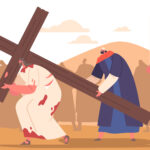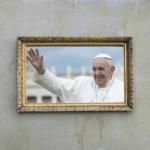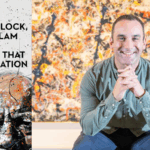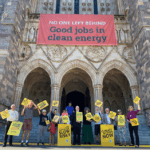Review: Conclave
Director Edward Berger’s Conclave is a riveting adaptation of Robert Harris’s bestselling novel, bringing together intrigue, moral dilemmas, and the weight of tradition in a story that asks fundamental questions about the Catholic Church’s future. Led by Ralph Fiennes in a captivating performance, the film dives deep into the machinations of power and faith within the cloistered walls of the Sistine Chapel, where the election of a new pope threatens to upend centuries of tradition—or cement the Church’s identity as a bastion of conservatism.
The story begins with the death of the reigning pope under mysterious circumstances, setting the stage for a tense and highly secretive conclave where 117 cardinals must choose the next leader of the Catholic Church. Ralph Fiennes portrays Cardinal Thomas Lawrence, the Dean of the College of Cardinals, tasked with overseeing the gruelling voting process which has the cardinals locked in the Sistine Chapel until they have consensus. Fiennes brings a quiet gravitas to the role, portraying Lawrence as a man grappling with his own faith while attempting to navigate the political currents and personal ambitions of his fellow cardinals.
As the conclave unfolds, we’re introduced to a cast of compelling characters, each representing a different vision for the Church’s future. There’s Cardinal Bellini (Stanley Tucci), a reformist advocating for a more progressive Church; Cardinal Tremblay (John Lithgow), a charismatic figure with a knack for media savvy; and Cardinal Adeyemi (Lucian Msamati), a rising star from Africa whose candidacy raises questions about the global reach and inclusivity of Catholicism. These figures serve as proxies for larger ideological battles, with their alliances, betrayals, and secrets driving much of the film’s suspense.
Berger masterfully captures the claustrophobic atmosphere of the conclave, using tight framing, dim lighting, and an evocative score to underscore the weight of the cardinals’ decision. The film’s pacing is deliberate rather than plodding, allowing for moments of quiet introspection that are as gripping as the more overtly dramatic scenes. Fiennes, in particular, excels in these quieter moments, conveying a deep inner turmoil that mirrors the Church’s existential crisis.
Thematically, Conclave is a profound exploration of the Catholic Church at a crossroads. The film asks whether the Church should remain rooted in its traditions, offering a steadfast moral anchor in an ever-changing world, or embrace progressive reforms to stay relevant in the 21st century. This tension is personified in the cardinals themselves, whose personal convictions and hidden agendas reflect the broader struggles facing religious institutions today.
One of the film’s strengths is its refusal to offer easy answers. The conservative faction’s emphasis on stability and moral clarity is contrasted with the reformists’ call for inclusivity and adaptability. These debates are framed not as binary choices but as part of a larger, ongoing conversation about the Church’s role in a rapidly evolving world.
The screenplay, adapted by Berger and playwright Peter Morgan, balances these weighty themes with moments of human vulnerability and even dark humour. The cardinals, despite their lofty positions, are portrayed as deeply flawed and human, with their ambitions, fears, and insecurities laid bare amongst their peers. This approach not only makes the characters relatable but also underscores the enormity of the task they face.
The film’s climax, which revolves around a shocking revelation and a surprising twist in the election, is both thought-provoking and emotionally resonant. Without delving into spoilers, it’s safe to say that the ending challenges viewers to consider what leadership truly means in the context of faith—and whether the path forward requires compromise, courage, or a leap of faith.
Visually, Conclave is a feast for the eyes. The production design captures the opulence and grandeur of Vatican City, while the cinematography by James Friend bathes the scenes in a chiaroscuro palette that evokes Renaissance paintings. This visual style not only enhances the film’s aesthetic appeal but also serves as a metaphor for the light and shadow that coexist within the Church.
While Conclave is undeniably a gripping drama, it also serves as a meditation on the nature of faith, power, and the human condition. It invites viewers—religious and secular alike—to reflect on their own beliefs and the role of tradition and change in shaping institutions and identities.
Fiennes’s performance anchors the film, but the ensemble cast is equally impressive, with standout turns from all the major players. Their portrayals add depth to a narrative that could easily have descended into caricature, ensuring that Conclave resonates on both an emotional and intellectual level.
Conclave is a thought-provoking and impeccably crafted film that offers a timely exploration of one of the world’s oldest and most influential institutions. By weaving together personal drama and ideological debate, it captures the essence of a Church at a turning point, torn between its past and its potential future. Whether you’re drawn to the film for its star-studded cast, its gripping narrative, or its exploration of faith and power, Conclave is a cinematic experience that lingers long after the credits roll.



